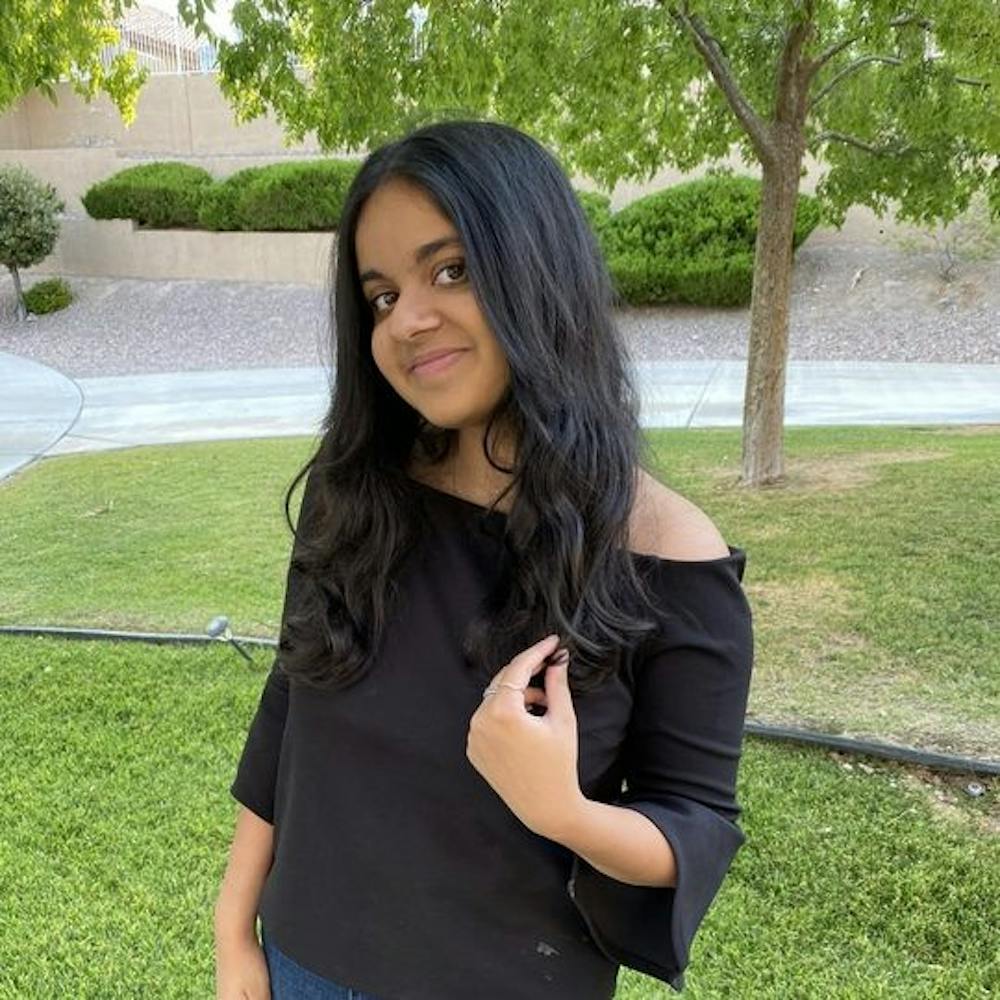After four years at The Emory Wheel, Editor-in-Chief (EIC) Brammhi Balarajan (23C) is concluding her term as EIC. In May, she will graduate with a degree in political science and English and creative writing from the Emory College of Arts and Sciences.
Balarajan took over as EIC in March 2022. She started out at the Wheel during her freshman year as a contributing writer for the Opinion section and created her political column, Brammhi’s Ballot, which went on to win first place nationally in the Society of Professional Journalists (SPJ) Large School Division General Column Writing contest. She also served on the Editorial Board and the Wheel’s Diversity, Equity and Inclusion task force. Balarajan assumed the role of Opinion Editor in 2020, where she spearheaded the 1963 Project, a series of articles on Emory University’s desegregation and racial inequities, which won a regional first-place award with SPJ. After moving into a role as Managing Editor, overseeing Opinion, Arts & Entertainment and the editorial board, she was elected EIC. Throughout her time at Emory, she has interned with The Georgia Voice and The Colorado Sun through The Dow Jones News Fellowship and the Asian American Journalists Association Voices fellowship.

Balarajan sat down with the Wheel to discuss her college and journalism journey.
This transcript has been edited for clarity and length.
Emory Wheel: Why did you join The Wheel, and what made you decide to run for EIC?
Brammhi Balarajan: My freshman year first semester, I went to an interest meeting with a horde of other freshmen, and it was really funny because everyone else was like editor-in-chief of their high school newspaper, had kind of done the whole thing before, and I was a little bit newer to the scene. I had done a little journalism in high school, but I hadn't fully been super committed to it throughout high school or anything. I remember talking to one of the people who later became my Managing Editor, Shreya Pabbaraju, at the interest meeting, and I remember her telling me that opinion can be a form of advocacy or a way to tell untold stories or tell stories that aren't often heard. That really resonated for me, so that's why I chose to join opinion because I really liked the idea of sometimes doing reporting, sometimes doing interviewing, but being able to use that and amplify other voices, but also your own voice, because I think your own voice is really important as well, and that’s how I kind of fell in love with writing and journalism and how I got invested from there.
And I think from there, my sophomore year, there were a lot of really important conversations happening with the death of George Floyd and with COVID and a lot of other things happening, and I wanted to become a really vocal voice in our newsroom for how we could be more equitable in our coverage and how we could be a more diverse newsroom, so that’s when I joined DEI, that’s when I tried to become really vocal about when I felt like we were doing things wrong or when I felt like we were not being as equitable or as inclusive as we could be. And, I think taking a stand and kind of asserting myself as a leader and as someone who really wanted to spearhead these changes, that helped establish me as someone who really cared about the Wheel and someone who really wanted to be more invested. And from there, I just got more and more involved. I held a lot of different positions, I helped manage a lot of different sections, I helped start a lot of different things.
[EIC] is a really thankless job. You’re pouring 40 hours a week sometimes, you’re doing so much work, you’re not really getting paid much and it’s so easy to feel unappreciated, but I think watching other people grow, watching other people build sections or come up with really cool articles or be able to do something they’re passionate about and being able to support people in doing that—I think that's what I've always wanted to do, that’s what I’ve loved doing as an editor and mentor, and I always saw being Editor-in-Chief as a way to do that on a larger scale and also able to just make the Wheel that could be something more diverse and inclusive.
EW: What is your favorite piece that you’ve written for The Wheel?
BB: I was actually re-reading one of my old pieces from the other day, but it’s when turnover happened and I was no longer, and I decided not to write for Opinion anymore because I wanted to try out some other sections, I wrote a goodbye to Opinion on why I love opinion writing and why I love sharing vulnerable stories, and I think that's probably my favorite piece I’ve written. And then, also an honorable mention to former Emory students reflecting on the gender quota 50 years ago when that was abolished because that was a very interesting story to do, and 1963 because that was just so pivotal to my journey at the Wheel.
EW: What are some of your favorite Wheel articles from any sections?
BB: Oh my gosh, that’s such a hard one because every day I feel like every day I read a new article and I'm so amazed because we have so much talent within the Wheel community. But, I mean, Sophia Peyser just came out with the “Love from Druid Hills” project, and I thought every piece in that was absolutely phenomenal. Our A&E writers all have this beautiful way of writing—Eythen’s Blu-ray column is always so fun to read. I could go on and on, but those are just a few favorites off the top of my head.
EW: In your time on the Opinion section, what’s the spiciest take you ever read?
BB: That’s a really good question … There was an article about how Emory shouldn't be testing sewage water during COVID, which I remember was published during my sophomore year, and I just remember that it raised a lot of conversation because it's just a really random article. And then, within our editorial board discussions, I’m not sure if it’s been the most controversial, but it’s definitely led to some really spirited debates. We had some really spirited debates, especially during COVID, about whether masking should still be mandated, about whether testing should be mandated.
EW: What’s your favorite memory from The Wheel?
BB: Doing production nights has just always been so fun and so meaningful. I think there's a different side you see to people when you're up with them until 4 a.m., 5 a.m. and just trying to get the wording of an article right, but also just seeing how everyone is so dedicated and committed to putting a paper together and putting these articles together and making sure everything looks great. People do this because they want to do it. They don't do it because there's any other incentive. We don't get paid. If you want a resume booster, there are probably things that are less of a time commitment you can do, but people do this because they really love it. Seeing that passion on print nights is like one of my favorite things about The Wheel.
EW: What is your favorite class or professor at Emory?
BB: Asian American History with Professor Chris Suh was a really interesting class, I really, really liked this one. And then, just any creative writing workshop. I've taken some nonfiction ones with Professor Klibanoff, who is [the Wheel’s] advisor, but I've also taken fiction writing with Tayari Jones and poetry writing with Robyn Schiff. No matter what major you are, I think everyone should take a creative-writing workshop.
EW: What are you going to miss most about Emory?
BB: The Wheel. I think that the Wheel is what I’ll miss the most. It's been some of the best times of my life and some of the worst times of my life, but I think there's nothing that I've ever been so dedicated to or so passionate about. and it's really taught me how to be passionate about your work and passionate about your writing, and I'm really gonna miss that. I'm really gonna miss these people, especially.
EW: What is the most important thing The Wheel has given you?
BB: The Wheel taught me how to stand up for myself, and it’s also taught me how to stand up for what I believed in. When I was a freshman, all the editors thought I was like the quietest person ever. It was so hard to get me to speak a word during editorial board meetings. I was not super outspoken and think now that’s not a way anyone at The Wheel would describe me probably. I've changed a lot because of how much change I wanted to see in the Wheel and how passionate I was about the Wheel, and so I think that’s something I’m glad changed about me and the Wheel helped me grow so much, and I'm really grateful for that.
EW: What advice would you give to future EICs and what advice would you give future writers?
BB: For future EICs, it's actually something the past EIC, Isaiah Poritz, told me right before I became EIC, and it ended up being really helpful. It’s that, when you make a decision, to write out exactly why you're making that decision and stick to it and to know that that's why you're making that decision. I think it's really easy to question yourself, and people aren't always going to like the decisions you make or why you make them, and just knowing exactly why you made that decision can be really, really helpful in times of stress or conflict. I would also add the note that you are more important than the job and that you are always more important than any job or any position.
And then, for future Wheel writers, I would say to challenge yourself. I think there's a lot of stories you can write that are right in front of our face, but I think challenging yourself to find new stories you didn’t know about, challenging yourself to write things about yourself that things you're scared of, challenging yourself to write with perspective and to write things about yourself that maybe you’re scared to put out in the world, I think that can be something that's really freeing, and that can be something that really pushes yourself. Do the writing that pushes yourself, even when it's scary.
Correction (3/3/23 at 5:59 p.m.): A previous version of this article stated that former Editor-in-Chief Brammhi Balarajan (23C) took over as editor-in-chief in February 2022. In fact, she became editor-in-chief in March 2022.
Correction (3/3/23 at 9:40 p.m.): A previous version of this article used the spelling Shreya Papparaju. In fact, it is Shreya Pabbaraju.







